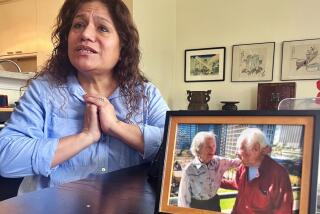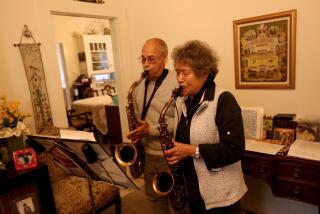Where’s Waldo McBurney? Still working at 104
- Share via
QUINTER, KAN. — At 104, Waldo McBurney has never known a life without work.
His first paying job was guiding a team of horses pulling a wheat thrasher. He was 13 and earned 50 cents a day.
After graduating from college in 1927, he worked a quarter-century at various jobs: vocational-agricultural teacher, county extension agent and at the local co-op. He started a business cleaning seeds for planting in the 1950s and ran it until he was 91. He took a decades-long hobby of beekeeping and went into the honey business, which he still has.
“I’m not a strong believer in retirement,” he said. “I don’t think retirement is in the Bible.”
Still spry and agile as he hustles across Main Street in this wind-swept High Plains farming community, McBurney is a man of two worlds -- one of horses, buggies and a slower pace of life; the other of cellphones, jet planes and measuring time in milliseconds.
“We’re living in a faster age and we think too much about money and leisure. Our morals have gone downward. There’s always hope, but it’s hard to see how the good is going to come,” he said. “A lot of the population thinks the biggest thing they can do is kill somebody they don’t agree with.”
McBurney grew up on a farm at a time when neighbors helped neighbors without asking, when life was more about work than worry.
“I expect people worry now more than then. Worry is a killer,” he said. “Back then, you did your chores, lit the kerosene lamp and read.”
But his life hasn’t been all work. He has enjoyed running since childhood and at age 65 took up long-distance running. A decade later, he began competing in the Senior Olympics, the World Masters and other events, winning 10 gold medals for track and field events.
Although he stopped competing a couple of years ago, he still manages the four-block walk most days from his white-framed house trimmed in blue to his Main Street office where he sells his honey and copies of his 2004 autobiography, “My First 100 Years: A Look Back from the Finish Line.”
In his book, he attributes his longevity to many things -- genes, exercise, food, mental attitude and faith. Many in his family lived into their 80s and 90s. He said lifestyle was more important than genes. For him, that has meant a lifetime without alcohol or tobacco.
“I always got along fairly well without them, so I still don’t know the taste of either of them,” he said.
With age, however, has come notoriety, something McBurney never really sought.
In November, Gov. Kathleen Sebelius awarded him the state Hometown Health Hero Award, calling him “truly a gift to our state and an inspiration to lead a healthy life.”
In October, he won the “America’s Oldest Worker for 2006” award from Experience Works, a national group that provides training and employment for seniors.
Town leaders erected a sign near his office: “Congratulations, Waldo. America’s Oldest Worker.” He brushes aside mention of the sign with a quip.
“I can just go about anywhere and be the oldest. The ones my age don’t run around that much,” said McBurney, his weathered face, steady hands and strong grip attesting to years of hard work.
He added with a serious tone: “I never considered myself a great character. They are testing my humility.”
Though it can’t be said definitively that McBurney is the oldest American working, the odds favor him -- centenarians make up 0.026% of the U.S. population.
Those who know McBurney say he’s a humble man.
“He doesn’t think he’s more special than anyone else. I don’t know if I’ve heard a negative word out of his mouth,” said Laura Kesler, vice president of KansasLand Bank. “He always looks at the positive side, and that’s probably why he’s lived as long as he has.”
McBurney was born Oct. 3, 1902 -- when flying was left to birds and people communicated by writing letters mailed for 2 cents. A workweek was 10 hours a day, six days a week, and McBurney and his four brothers and a sister had their share of farm chores -- something youngsters don’t understand today.
“The kids in the city come home from school with nothing to do. They sit down in front of the TV with a bottle of pop and a sack of potato chips and they get fat,” he said.
Saturday was when folks went to town to shop and visit. The barber shop stayed open till midnight so men could spruce up for Sunday.
McBurney is a repository of yesterdays with stories of walking a mile and a half to school, of one of his teachers cheering Woodrow Wilson’s 1912 presidential victory, of drinking water from an outdoor pail with a long-handled dipper and of setting traps for gophers and skunks so he could get spending money.
“So many things have changed. People used to raise their own food. People in town kept cows in the pasture at the end of town for milk,” he said. “You used to see sidewalks. Now they don’t build them anymore because they don’t use them that much.”
He recalls when it took a half an hour to travel three miles in a wagon on an unpaved road.
But he has adapted to the changing times, and even has a cellphone.
“I don’t use it very much,” he said. “I had to get it because my wife wanted to know what ditch I’m in if I don’t get back.”
He wears glasses, but his eyesight is good enough that his driver’s license was renewed in September. Yes, he still drives, but not often. And when he flies, airline officials look twice at his birth date.
“Some of them act like they doubt it,” he said.
Despite the spotlight, McBurney lives a low-key lifestyle with his wife of 44 years, 92-year-old Vernice. They have five adult children from previous marriages.
“He’s pretty gentle, but he has a mind of his own,” she said.
He responded with a chuckle: “When we got married, the deal was she would look after me in my old age and give me a decent burial. Well, she’s taken care of me but she hasn’t buried me yet.”
With religion the center of his life, McBurney says he doesn’t worry about death.
“The Bible says God will supply all your needs,” he said. “I feel like the next life is secure.”


